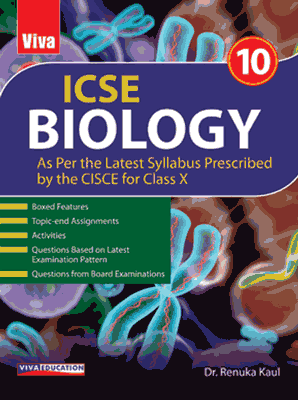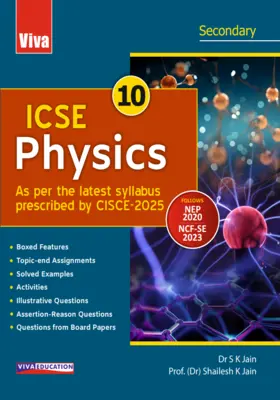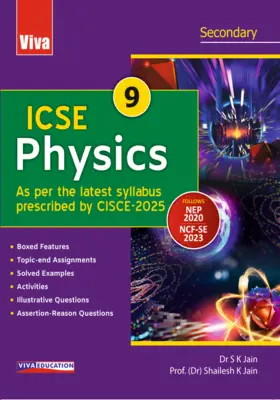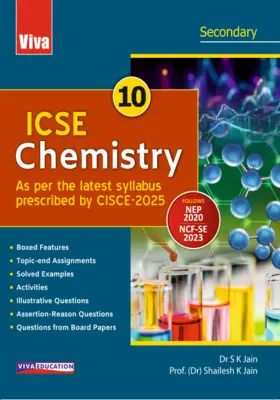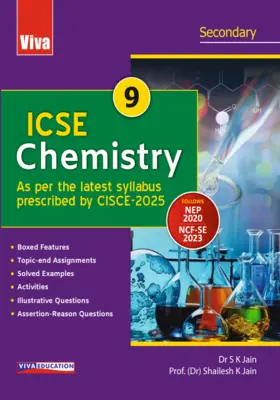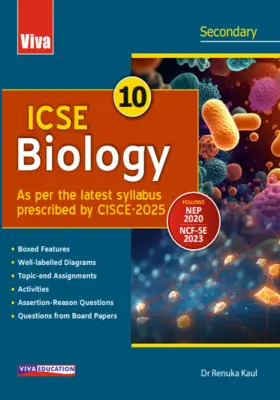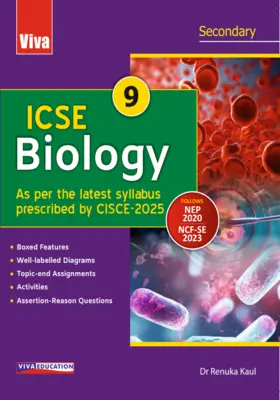Viva ICSE Biology - Class 10
Viva ICSE Biology - Class 10
As Per the Latest Syllabus Prescribed by the CISCE for Class X
₹695.00
Go to cartISBN: 9789389662481
Bind: Paperback
Year: 2020
Pages: 272
Size: 216 x 279 mm
Publisher: Viva Education
Exclusive Distributors: Viva Books
Sales Territory: Worldwide
Description:
Boxed Features
Topic-end Assignments
Activities
Questions Based on Latest Examination Pattern
Questions from Board Examinations
The book VIVA ICSE BIOLOGY for Class X has been prepared with a hope that it will be able to meet the academic aspirations of the young inquisitive minds.
Salient Features of the Book
- Based on the latest syllabus of Biology prescribed for Class X by the Council for the Indian School Certificate Examinations, New Delhi, year 2021
- An informal, interactive style of presentation
- A large number of questions (based on latest examination pattern), well-labelled diagrams, illustrations, tables, pictures, and flow charts
- Topic-end assignments which can be used for class tests or homework
- Boxed features highlight the important information related to different topics discussed
- Activities, wherever required, to understand a topic in an interactive way
- Pointwise summary, for a quick revision of contents, provided at the chapter-end
- Questions from Question Papers of board examinations held in the past few years (upto 2019)
Target Audience:
This book is useful for ICSE class X biology students.
Contents:
Chapter 1. Cell Cycle, Cell Division and Structure of Chromosomes • Cell division • Cell cycle • Phases of mitosis • Significance of mitosis • Meiosis (or reduction division) • Significance of meiosis • Chromosomes • Structure of chromosomes • Gene • DNA and its structure
Chapter 2. Genetics • Variations • Rules for the inheritance of traits: Mendel's contribution • Mendel's laws of inheritance • How are the traits expressed• • Sex determination in human beings • Sex-linked inheritance • Sex-linked Inheritance of diseases
Chapter 3. Absorption by Roots • Root system • Absorption of water • Active and passive transport • Tonicity • Plasmolysis • Turgidity and flaccidity • Absorption of water and minerals by plants • Root pressure • Cohesive, adhesive forces and transpirational pull • Ascent of sap
Chapter 4. Transpiration • Types of transpiration • Factors affecting transpiration • Adaptations in plants to reduce excessive rate of transpiration • Significance of transpiration • Advantages of transpiration • Disadvantages of transpiration • Demonstration of transpiration • Measurement of transpiration • Direct loss of water by plants
Chapter 5. Photosynthesis • Important events in photosynthesis • Requirements of photosynthesis • Mechanism of photosynthesis • End-products of photosynthesis • Significance of photosynthesis • Adaptations in leaf for photosynthesis • Factors affecting photosynthesis • Experiments on photosynthesis • Carbon cycle
Chapter 6. Chemical Coordination in Plants • Tropic movements in plants • Plant growth regulators (or plant hormones)
Chapter 7. The Circulatory System • Blood • Blood group • The heart: a pumping organ • Lymphatic system
Chapter 8. The Excretory System • Types of waste products • Different excretory organs in the human body • Excretion in humans • Mechanism of urine formation • Significance of excretion • Haemodialysis
Chapter 9A. The Nervous System • Animals • nervous system • Types of nervous actions • Human nervous system
Chapter 9B. Sense Organs • Types of sensory receptors • The eyes • Stereoscopic vision • Adaptation of eye • Power of accommodation • Defects of the eye • How eyes can see objects • The ears
Chapter 10. The Endocrine System • Characteristics of hormones • Glands • Human endocrine system • Homoeostasis and hormonal feedback system
Chapter 11. The Reproductive System • Asexual reproduction • Sexual reproduction • Sexual reproduction in human beings • Twins
Chapter 12. Population • World population • Population trend in India • Growth model • Reasons for unchecked growth of the population in the world • Reasons for unchecked growth of the population in India • Population explosion • Consequences of increasing population in India • Population control
Chapter 13. Human Evolution • Theory of inheritance of acquired characters • Basic postulates of Lamarck's theory • Evidence from vestigial organs • Darwin's theory of evolution • Human evolution
Chapter 14. Pollution • Waste • Types of environmental pollution • Effects of pollution on climate and environment • Euro/Bharat stage vehicular standard • Swachh Bharat Abhiyan • A National Campaign for Clean India
About the Author:
Dr. Renuka Kaul has done her PhD in education from DBHPS University, Chennai. She has been dedicated for many years to the marathon task of brightening up the career of children deprived of resources and means to get proper education. She is the brain behind the path-breaking initiative to formulate and design video lectures based on different curricula with a view to reaching out to students from remote areas without adequate educational facilities. She has been at the forefront of several reputed institutions based in Delhi and Mumbai, serving in the capacity of Principal. She has authored numerous books on science and E.V.S. for students at different levels of learning. She is also credited with having written books on Teachers Eligibility Test (CTET, HTET). A recipient of Dr. S Radhakrishnan Memorial National Teachers award, Dr. Renuka Kaul also takes keen interest in creative writing with particular focus on the empowerment of women. Her work has been frequently featured in TV serials and Radio programmes.
